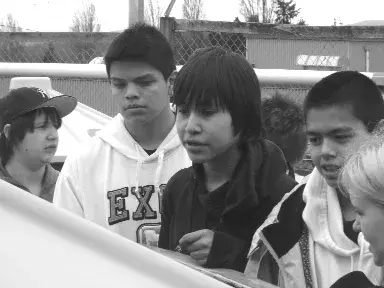Forty-four students and ten chaperones attended a two-day event promoting fisheries careers and business opportunities available to Nuu-chah-nulth. Sponsored by Uu-a-thluk, the field trip included grades 9-12 students from Kyuquot, Zeballos, and Maaqtusiis Schools.
Gathering at Nanoose First Nation on March 22, students and chaperones began with a tour of a commercially run smokehouse owned and operated by Ahousaht member, Edith Fred. Donning the caps and booties required for visitors, they learned the importance of cleanliness in a commercial facility. They also assumed the roles of commercial smokehouse workers, learning how to correctly receive fish and fire up the smoker. “I’m very proud of my ancestry,” Edith told visitors. “I’m proud to be running my own business because I get to set my own hours and work for myself.”
Next, Randy Fred of Tseshaht gave a presentation about seafood business opportunities. “There are a lot of opportunities for Nuu-chah-nulth people,” he said, outlining the Nuu-chah-nulth history with seafoods. Currently involved in a historic deal to process abalone from the Bamfield/Huu-ay-aht Abalone Project, Randy was hopeful. “You can do just about anything you want to do.”
Following the presentation, students took part in activities with a marine biology theme led by Department of Fisheries and Oceans Education Coordinator, Christy Wilson. Over dinner they listened to Penny White, a UBC fisheries graduate student from the Tsimshian Nation. White talked about the kinds of careers available and why they’re important to First Nation students. “This is life fulfilling work,” she said.
The second day of the trip, students gathered at Malaspina University College for Aboriginal Student Day. Starting in the theatre, they listened to presentations by First Nations students, including Leona McBride from Ehattesaht. She had this advice: “Getting your education is hard and there are going to be obstacles, but you have to decide if you’re going to let them block you or if you’re going to go around them.”
Touring the Fisheries and Aquaculture department, students also heard from Johnnie Manson of Tla-o-qui-aht, who created and delivered a presentation about working in the shellfish industry. Along with a fellow student, Manson told the visitors how important shellfish production is to coastal communities. He also explained how thrilled he was to be able to talk to them. “This is the culmination of my time here at Malaspina—standing up here talking to you.”
Planning to continue his studies in fisheries and possibly pursue a degree, Manson was confident about his prospects. “I’m not worried about finding a job,” he said in conversation as students surveyed tanks filled with urchins and clams. “I dropped out of high school, but I made the decision to go back and get my education. Now that I’m here I can see what kinds of opportunities are available.”
Submitted by Uu-a-thluk Capacity Building Coordinator, Shannon Cowan







